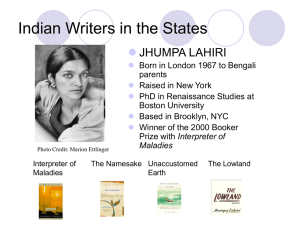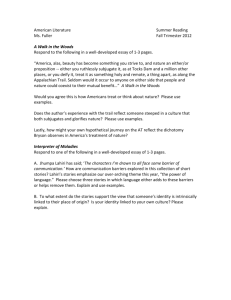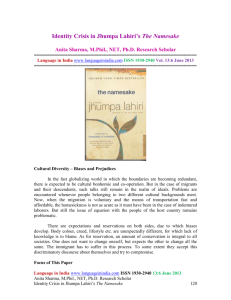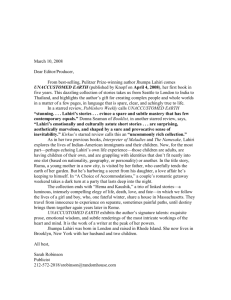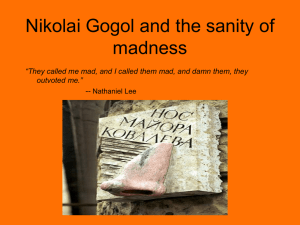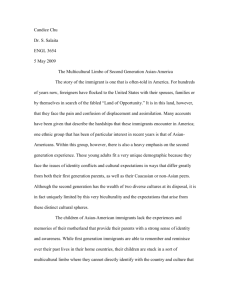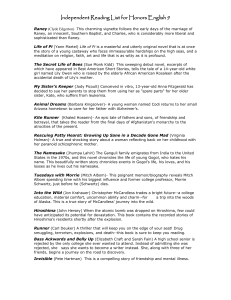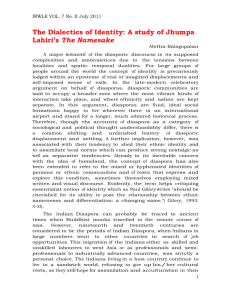Diasporic Crisis of Dual Identity in Jhumpa Lahiri's The Namesake
advertisement
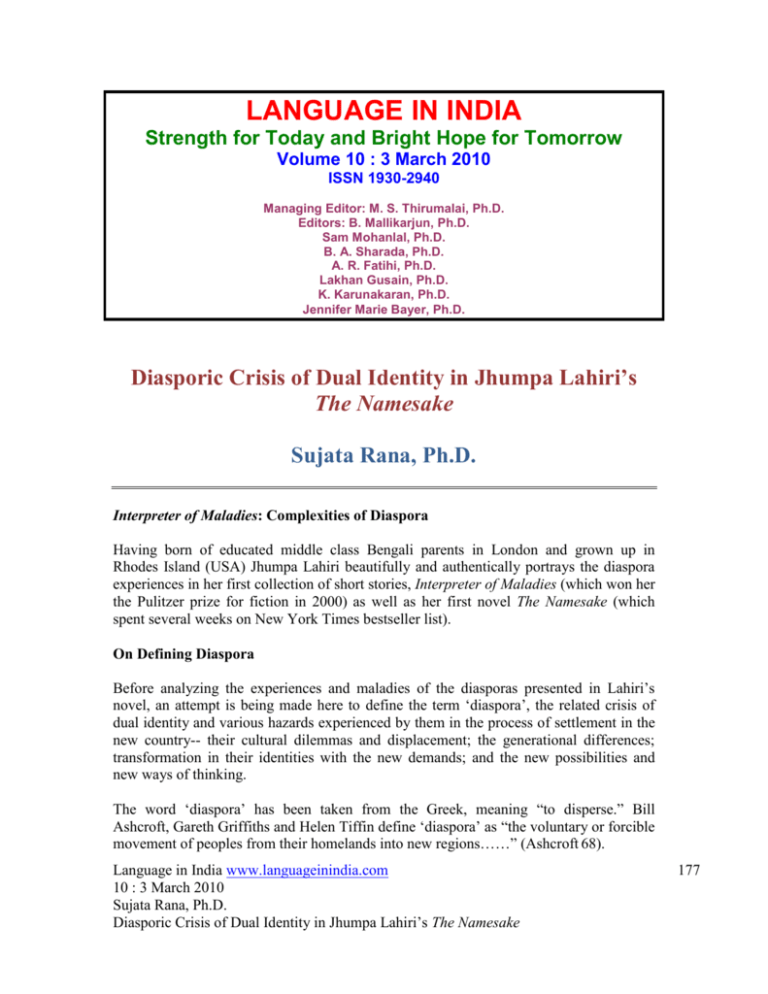
LANGUAGE IN INDIA Strength for Today and Bright Hope for Tomorrow Volume 10 : 3 March 2010 ISSN 1930-2940 Managing Editor: M. S. Thirumalai, Ph.D. Editors: B. Mallikarjun, Ph.D. Sam Mohanlal, Ph.D. B. A. Sharada, Ph.D. A. R. Fatihi, Ph.D. Lakhan Gusain, Ph.D. K. Karunakaran, Ph.D. Jennifer Marie Bayer, Ph.D. Diasporic Crisis of Dual Identity in Jhumpa Lahiri’s The Namesake Sujata Rana, Ph.D. Interpreter of Maladies: Complexities of Diaspora Having born of educated middle class Bengali parents in London and grown up in Rhodes Island (USA) Jhumpa Lahiri beautifully and authentically portrays the diaspora experiences in her first collection of short stories, Interpreter of Maladies (which won her the Pulitzer prize for fiction in 2000) as well as her first novel The Namesake (which spent several weeks on New York Times bestseller list). On Defining Diaspora Before analyzing the experiences and maladies of the diasporas presented in Lahiri‟s novel, an attempt is being made here to define the term „diaspora‟, the related crisis of dual identity and various hazards experienced by them in the process of settlement in the new country-- their cultural dilemmas and displacement; the generational differences; transformation in their identities with the new demands; and the new possibilities and new ways of thinking. The word „diaspora‟ has been taken from the Greek, meaning “to disperse.” Bill Ashcroft, Gareth Griffiths and Helen Tiffin define „diaspora‟ as “the voluntary or forcible movement of peoples from their homelands into new regions……” (Ashcroft 68). Language in India www.languageinindia.com 10 : 3 March 2010 Sujata Rana, Ph.D. Diasporic Crisis of Dual Identity in Jhumpa Lahiri‟s The Namesake 177 Robert Cohen describes diasporas as the communities of peoples living together in one country who “acknowledge that the old country-- a nation often buried deep in language, religion, custom or folklore--always has some claim on the loyalty and emotions”(Cohen ix ). Diasporas thus live in one country as community but look across time and space to another. The migrant diasporas and their descendents experience displacement, fragmentation, marginalization and discontinuity in the cultural „discourse‟ of the subject countries. Living in-between Condition This living „in-between‟ condition is very painful and marginalizing for the diasporas. There is yearning for “home,” to go back to “the lost origin” and “imaginary homelands” (Rushdie9--21) are created from the fragmentary and partial memories of the homelands. They face cultural dilemma when their cultural practices are mocked at and there is a threat to their ethnic and cultural identity. They stand bewildered and confused, nostalgic and homesick and show resistance also to the discourse of power in various forms. In the following generations these confusions, problems and yearnings become less intense as they get influenced by the culture of that country and also adapt themselves to it. Though the children born to migrant peoples enjoy better settlement and place in that country but “their sense of identity borne from living in a diaspora community [is] influenced by the past migrant history of their parents or grandparents” (McLeod 207) . Changes in Attitudes During their stay in the new country and in interaction with the representative culture the subjectivities and modes of thinking of the diasporas also change and they too intervene in the cultural discourse of the dominant culture. Thus there comes a considerable change in the outlook and identities of diasporas with the changed global economic, political and cultural scenario. Identity Crisis The identities of diaspora individuals and communities can neither be placed only in relation to some homeland to which they all long to return nor to that country alone where they settle down in. They, by all means, face the crisis of hybrid or dual identity, which makes their existence all the more difficult. This is an experience universal to all Indian diaspora, irrespective of their caste, region and religion (which they so strongly and fanatically clung to during their stay in India). The Indian Diaspora Language in India www.languageinindia.com 10 : 3 March 2010 Sujata Rana, Ph.D. Diasporic Crisis of Dual Identity in Jhumpa Lahiri‟s The Namesake 178 Second in number after the Chinese, the Indian diaspora consists of more than 15 million individuals through the world, gathered especially in Great Britain and in the US. And Indian diasporic literature arresting global attention today, is usually by and about educated migrants or their descendants. It deals with issues like alienation, nostalgia, identity crisis, discrimination etc. It operates in a cultural space haunted by heterogeneity, and attempts to reconcile with alien realities. A literary maze concerned with questions of equality and identity, it attempts assimilation with host country and culture. All diasporic fiction, thus, is replete with issues related to location, movement, crossing border, original home and adopted home and identity. A Chronicler of Diaspora Among others Jhumpa Lahiri is famous as the acclaimed chronicler of the Bengaliimmigrant experience. The majority of her stories are about exile, about people living far from home and moving to new world. Both Interpreter of Maladies and The Namesake explore the ideas of isolation and identity, not only personal but also cultural. When their cultural and ethnic identity is blurred in a foreign land, their personal identity, signified strongly by their name also stands vulnerable to change. The characters in both the works frequently encounter crisis of identity, which is tied to inabilities to reconcile the American identity with their Indian identity. The Namesake – Living in Two Worlds Simultaneously The Namesake is a documentary of immigrant‟s lives who feel displaced and homesick, floating in an anonymous island, far away from home. The vital question for them is that of identity and their ongoing quest for it. The novel, which came out in 2003 grabbed instant recognition and fame and was made into a Hollywood movie later. Before going into details of the plot to discuss the theme of diasporic conflict of dual identity in The Namesake it would be helpful to mention Lahiri‟s own remarks. In an interview released by Houghton Mifflin Company Lahiri says that the novel is definitely about those “who are culturally displaced or those who grow up in two worlds simultaneously” Talking about the predicament of immigrants Jhumpa Lahiri says: “I think that for immigrants, the challenges of exile, the loneliness, the constant sense of alienation, the knowledge of and longing for a lost world, are more explicit and distressing than for their children”. The Autobiographical Vein The novel definitely has an autobiographical vein as Lahiri‟s experience of growing up as child of immigrants resembles that of her protagonist, Gogol in the novel. In the same interview she says: “I wanted to please my parents and meet their expectations. I also Language in India www.languageinindia.com 10 : 3 March 2010 Sujata Rana, Ph.D. Diasporic Crisis of Dual Identity in Jhumpa Lahiri‟s The Namesake 179 wanted to meet the expectations of my American peers, and the expectations I put on myself to fit into American society. It‟s a classic case of divided identity.” Everything is in a Name: Agonizing Story of Gogol Like Gogol her pet name inadvertently became her good name. She has two other names on her passport and her birth certificate. But when she was enrolled in school the teachers decided that Jhumpa was the easiest of her names to pronounce. Talking about the diasporic crisis of dual/hybrid identity Lahiri, in the same interview, reflects: “The original spark of the book was the fact that a friend of my cousin in India had a pet name Gogol. I wanted to write about a pet name/ good name distinction for a long time. It is almost too perfect a metaphor for the experience of growing up as the child of immigrants, having a divided identity, divided loyalties etc.” Our Identities and Our Names Our names definitely signify our identities. In a conversation with Mira Nair, director of Hollywood movie on Lahiri‟s novel The Namesake Jhumpa Lahiri says, “The names we have, there is so much about them: who are we and they are the one world that exists that represents us. And yet we don‟t choose them. These are from our parents.” Addressing the themes of immigration, collision of cultures and importance of names in The Namesake, Lahiri demonstrates how much of a struggle immigration can be. According to Dubey, “The immigrant experience is complicated as a sensitive immigrant finds himself or herself perpetually at a transit station fraught with memories of the original home which are struggling with the realities of the new world”(Dubey 22). This constant struggle is portrayed in The Namesake, as first generation immigrants and their children struggle to find their places in society. As the Ganguli parents, especially Ashima, struggle with adapting to a different culture than they are used to, their children (Gogol and Sonia) struggle with trying to respect their roots while adapting to American society. Complexity of Names in Bengal Bengali children are given two names: one that is a pet a name, used only by family and close friends, and one that is good name, used by the rest of the society. At birth, Gogol is given a pet name as his official name sent in a letter from his great grandmother in India, gets lost in the mail. Upon entering kindergarten, Gogol is told by his family that he is to be called Nikhil, a good name, by teachers and the other children at school. Gogol rejects his proper name and wants to be called Gogol by society as well as his family. This decision made on the first day of kindergarten causes him years of distress as it was also his first attempt to reject a dual identity. The importance of a namesake and identity Language in India www.languageinindia.com 10 : 3 March 2010 Sujata Rana, Ph.D. Diasporic Crisis of Dual Identity in Jhumpa Lahiri‟s The Namesake 180 is brought up throughout the story and becomes a concept that is central to the novel. Throughout his life Gogol suffers from the uniqueness of his name. Gogol’s Life Story In Bengali families “…individual names are sacred, inviolable. They are meant to be inherited or shared” (Lahiri 28). However, Gogol spends his life living in the United States where children are often ashamed of their differences from others. During adolescence, Gogol desires to blend in the American society and to live unnoticed. Other Americans never view him an American, however, even though he is a native born citizen. This presents a struggle between two cultures. The Ganguli‟s wish is to raise Gogol and his sister with Bengali culture and values. But, Gogol and Sonia grow up relating mostly to their peers and surrounding culture in the United States. They face the diasporic crisis of dual identity as they fail to reconcile their ethnic background with American culture. When he leaves for college, Gogol rejects his identity completely and becomes Nikhil (his long lost proper name that he rejected as a child).He dreads his visits home and his return to a life where he is known as Gogol. Gogol is not just a name to him; it signifies all his discomfort to fit into two different cultures as he grew up. His father, Ashoke Ganguly, named him Gogol due to the circumstances of his survival of a train wreck during which he was reading the work of the Russian writer Nikolai Gogol. The rescuers found him lying injured in the rubble of the wreck due to the piece of page from Nikolai Gogol‟s book he was still ctutching in his hand. To Ashoke, the name of Gogol signifies a beginning, a survival and everything that followed that terrible night of train crash in India. But it is difficult for Gogol to understand the emotional significance of his name. He is afflicted from birth with a name that is neither Indian nor American nor even really a first name at all. Being away from home at college makes it easy for Gogol to live as Nikhil in an American culture. He does so happily for many years, detaching himself from his roots and his family as much possible. Frustration of Being Different from Others Though Gogol and his sister Sonali (Sonia) are born and raised in the U.S. they feel the frustration of being different from most of the kids they know. Some mock their names, some vandalize their mailbox with derogatory terms and some just find them funny. When his high school class reads „The overcoat,” a short story written by the Russian writer Nikolai Gogol, Gogol is extremely ashamed of his name. Despite his parents‟ efforts to keep him “indianized,” Gogol starts behaving like his American friends and doing the same things that they do. For example, his parents didn‟t Language in India www.languageinindia.com 10 : 3 March 2010 Sujata Rana, Ph.D. Diasporic Crisis of Dual Identity in Jhumpa Lahiri‟s The Namesake 181 know about him secretly smoking with his friends, or him going to late night parties. Despite all of that, he manages to get good grades and gets into Yale University. There he learns about his namesake, Nikolai Gogol, and that he was a mentally unstable pariah and starts to hate his name. Because of this, he changes it to Nikhil in order to distance himself from all the bindings of his family and shun all their expectations. He gets attached to a white American girl, Ruth but they soon separate after Ruth spends both spring and summer terms in England studying literature. Gogol’s Affairs Gogol‟s second affair is with Maxine, an Anglo-Saxon American ethnicity and a member of a liberal and very wealthy Manhattan family. He starts to live with her family and gets closer to her family and moves away from his own. Although they love each other, they eventually break up when Gogol returns after performing all the Bengali rituals on his father‟s death. They have a fight over Gogol‟s struggles regarding the emotional complications related to his father‟s death. Gogol‟s final, but again unsuccessful attachment is with Moushumi Mazoomdar, a childhood friend from another Bengali family. After his break up with Maxine, Ashima talks to Gogol on starting a relationship with Moushumi, particularly due to their shared cultural background. Although she grew up in England, Moushumi shares a great deal in common with Gogol and the two eventually marry. However, their marriage breaks up when Moushumi starts having a sexual affair with her old love interest, a man named Dimitri. Free from All Demands? Lahiri takes Gogol back to his family in the last chapter of the book. They spend Christmas together. He begins to think of his family‟s history as a series of accidents from his father‟s train crash to his doomed marriage. The book ends, with him thinking that he is now free to do what he pleases without the expectations of either his family or the demands of American society. It is not necessarily a happy ending, but one with a hope, nevertheless. Lahiri‟s The Namesake is about a Calcutta family, settled in America but attempting to do the best they can by not only transforming into true Americans but at the same time retaining their Bengali customs and heritage. The writer skillfully investigates the intricacies of the diasporic feelings of strangeness, the conflicting ways of life, cultural bewilderment, the struggles of assimilation and the intervening ties between generations. The parents struggle with raising their children in America while maintaining their Language in India www.languageinindia.com 10 : 3 March 2010 Sujata Rana, Ph.D. Diasporic Crisis of Dual Identity in Jhumpa Lahiri‟s The Namesake 182 culture. The children struggle with being American, but still having parents who are from India, thus facing the crisis of dual identity. Gogol finally learns that the answer is not to fully abandon or attempt to diminish either Indian or American culture, but to mesh the two together. The diasporic crisis of dual identity faced first by his mother, Ashima, then in a more intensified manner, by him finally gets resolved when Gogol realizes that his identity is embellished by both cultures. He does not have to be one or the other; he does not have to choose. He is made up of both, and instead of weakening his pride, his identity is strengthened by this. Coming out of his turmoil Gogol is able to stand on his feet and is no longer ashamed of himself or the way he has lived his life till then. He has assimilated himself in American culture and values, at the same time retaining his parents‟ Indian heritage and is now proud of his name Nikhil Gogol Ganguly and all that it means. Works cited 1. Aschcroft, Bill, Gareth Griffiths and Helen Tiffin (eds.). 1998. Key concepts in Postcolonial Studies. Routledge. P. 68. 2. Cohen. Robert (1997). Global Diasporas: An Introduction. UCI Press. P.ix 3. Rushdie, Salman, (1991). “Imaginary Homelands” in Imaginary Homelands: Essays and Criticism 1881-1991.Granta.pp 9-21. 4. Mcleod, John. (2000). Beginning Postcolonialism. New York: Manchester University Press. P. 207. 5. Dubey, Ashutosh, (2002) Immigrant Experience in Jhumpa Lahiri‟s “Interpreter of Maladies”. Journal of Indian Writings in English 30. 2 pp. 22-6 6. Lahiri, Jhumpa(2003).The Namesake .Mariner Books. p.28. 7. hinduism.about.com/library/weekly/…/bl-jhumpainterview.htm (interview released by Houghton Mifflin company) 8. http:/www.youtube.com/watch(in conversation with Mira Nair about The Namesake) Sujata Rana, Ph.D. Language in India www.languageinindia.com 10 : 3 March 2010 Sujata Rana, Ph.D. Diasporic Crisis of Dual Identity in Jhumpa Lahiri‟s The Namesake 183 Department of English CRM Jat PG College Hisar-125001 Haryana, India Language in India www.languageinindia.com 10 : 3 March 2010 Sujata Rana, Ph.D. Diasporic Crisis of Dual Identity in Jhumpa Lahiri‟s The Namesake 184

